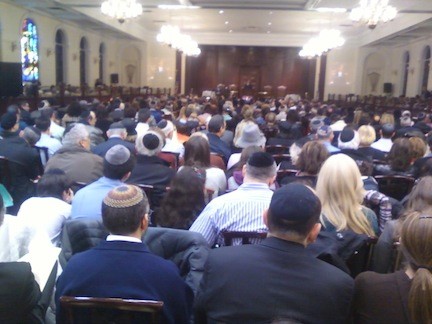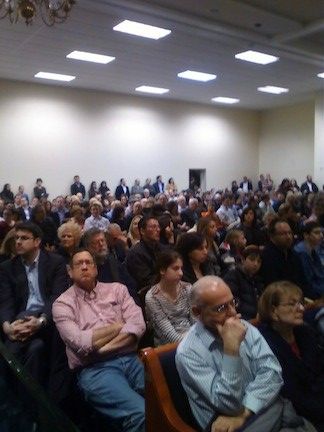Over 800 fill Beth Sholom to commemorate the Holocaust
Over 800 solemn and attentive men, women, and children filled the main sanctuary at Congregation Beth Sholom in Lawrence for the community wide annual memorial service for Yom Ha’Shoah.
At 6:30 PM, the usually quiet corner of Broadway and Washington was bustling as it would on a wedding night. There were a handful of Nassau County police officers present. Inside the shul, there was a table set up for candles as a memorial for the souls of those who were murdered in cold blood in the Holocaust or “the Shoah” (catastrophe). A paper with the program information on it stated that the program would take place at twenty four other synagogues throughout the Five Towns and Queens.
Besides the usual accommodations for four hundred people the ballroom now had seats for over eight hundred. At six fifty the stage was crammed with the HALB fifth grade choir, led by Sandy Shmuely. They sang songs that expressed faith in G-d regardless of pain and doubt. In the last few minutes of the performance, many new guests had arrived; some managed to attain seats for themselves while others remained at the event standing.
Psalms one thirty, one twenty, one twenty one, and six where recited aloud. Danna Frankel was in charge of the proceedings. After the choir had finished their act, Frankel spoke about her gratitude to her grandmother who survived the Holocaust. She stated that there were six survivors present. She informed the audience that there would be a video with a number of personal accounts, a personal address from Rabbi Ariel Rackovsky, Rav of the Irving Place Minyan, two personal stories of survival, and evening prayers to be held at the end.
On the video was a woman in her eighties describing how the Nazis had told her there will be no more school and forced her to leave. She stressed the importance of telling children about the Holocaust. The woman on the video was Fanya Gottesfeld whom I did not yet know was going to be the keynote address. She was followed by a few other women and one man who shared similar memories.
Rabbi Ariel Rackovsky spoke about the importance of recognition that national enemies are not a onetime event, rather they may be in every generation. Were it not for G-d, we as a nation would no longer exist. After the rabbi finished his address, the crowd went quiet. Fanya Gottesfeld began to share her story. She recalled being in kindergarten when she heard a bomb go off. After that bomb, school had ended for her there in the Ukraine. She and her mother were put in line and ordered to march barefoot. After sensing the severity of the situation, she and her mother said the shema (prayer said before one dies).
After that, she remembered the sun coming out as her mother got off the line and ran to tell an S.S officer that they were not even Jewish. For some reason she was believed and they were sent back to their residence. The next speaker, Annette Baslow-Finger, was ten years old when the Holocaust came through her town. She, her parents, and some other extended family all began to hide.
The family had a goal to reach Spain. She shared some brilliant advice her father had given her when she was despondent and missing her regular childhood. Her father told her Chanukah night that although she had no physical menorah if she looked into the sky she would see lights. It was suggested that she take the biggest light and use it as her center light to be followed by eight others. Her family did reach their destination after three and a half months of walking.
In closing she asked the audience to do an act of kindness for someone and it can cause a ripple effect to the other side of the world. This lesson as she called it was a “gift” from her father.
Yom HaShoah was inaugurated in 1953, anchored in a law signed by the Prime Minister of Israel, David Ben-Gurion, and the President of Israel, Yitzhak Ben-Zvi. The original proposal was to hold Yom HaShoah on the 14th of Nisan, the anniversary of the Warsaw ghetto uprising (April 19, 1943), but this was problematic because the 14th of Nisan is the day immediately before Pesach (Passover). The date was moved to the 27th of Nisan, which is eight days before Yom Ha’atzma’ut, or Israeli Independence Day.

 50.0°,
Overcast
50.0°,
Overcast 







